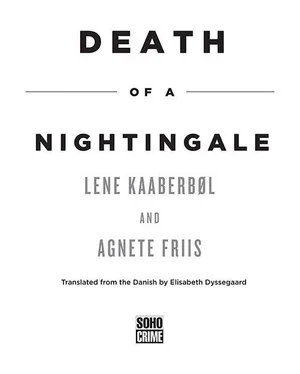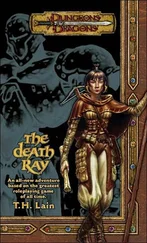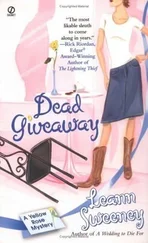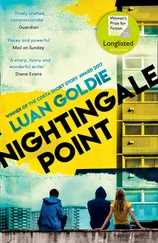Lene Kaaberbol - Death of a Nightingale
Здесь есть возможность читать онлайн «Lene Kaaberbol - Death of a Nightingale» весь текст электронной книги совершенно бесплатно (целиком полную версию без сокращений). В некоторых случаях можно слушать аудио, скачать через торрент в формате fb2 и присутствует краткое содержание. Год выпуска: 2013, ISBN: 2013, Издательство: Soho Crime, Жанр: Старинная литература, на английском языке. Описание произведения, (предисловие) а так же отзывы посетителей доступны на портале библиотеки ЛибКат.
- Название:Death of a Nightingale
- Автор:
- Издательство:Soho Crime
- Жанр:
- Год:2013
- ISBN:1616953047
- Рейтинг книги:5 / 5. Голосов: 1
-
Избранное:Добавить в избранное
- Отзывы:
-
Ваша оценка:
- 100
- 1
- 2
- 3
- 4
- 5
Death of a Nightingale: краткое содержание, описание и аннотация
Предлагаем к чтению аннотацию, описание, краткое содержание или предисловие (зависит от того, что написал сам автор книги «Death of a Nightingale»). Если вы не нашли необходимую информацию о книге — напишите в комментариях, мы постараемся отыскать её.
Death of a Nightingale — читать онлайн бесплатно полную книгу (весь текст) целиком
Ниже представлен текст книги, разбитый по страницам. Система сохранения места последней прочитанной страницы, позволяет с удобством читать онлайн бесплатно книгу «Death of a Nightingale», без необходимости каждый раз заново искать на чём Вы остановились. Поставьте закладку, и сможете в любой момент перейти на страницу, на которой закончили чтение.
Интервал:
Закладка:
“I understand that you were the one Natasha called after her attempt to kill Vestergaard?”
“How do you know that?” The words flew out of Nina, hostile, distrustful, before she had time to consider. He didn’t answer her directly, but he didn’t need to. He probably already had a whole pile of reports lying on his table. Why had she called him?
Because you needed help, she told herself.
She glanced at the clock above the serving hatch. Morten and the children were presumably eating dinner now. It wouldn’t be pizza or some other kind of junk food—Morten was good at all that healthy stuff, always making sure they got enough vegetables and slow carbohydrates. She closed her eyes a moment so she couldn’t see the clock’s digits. She knew that her time-checking was more than a bad habit. “OCD Lite,” so to speak. Not quite on par with the poor people who scrubbed their hands bloody for fear of germs, but … she had to get it under control.
She saw the minute hand move down to 18:21. Tomorrow it was Fastelavn Sunday. Not content with merely importing American Halloween customs, Denmark still stuck stubbornly to her own homegrown equivalent as well, so now there were twice as many costumes to be produced by long-suffering parents. Except this year, Nina wasn’t long-suffering, she reminded herself; Morten would have seen to Anton’s outfit for the school carnival. But she would still get to see Anton, and maybe even Ida too, if it wasn’t beneath the dignity of a fourteen-year-old to participate.
“I’m just trying to get a clear picture,” said Søren the PET-man on the phone. “You called emergency services, but you also went out there yourself?”
“Yes. I wasn’t sure … sometimes people get flashbacks. Or hallucinations. Natasha was pretty incoherent on the phone; I didn’t know how serious the situation was.”
“So you were, in fact, present just after the EMS got there?”
“Yes.”
It came rushing back: the heat that felt more like August than September, the dark hedges, the house with the front door wide open and all the lights on. The police hadn’t come yet—just the ambulance. It was parked in the driveway, its back doors open. The EMS people were already rolling in the gurney, and she could hear the bastard shouting hoarsely.
“She stabbed me! She goddamned stabbed me!”
Natasha just sat in the middle of the lawn with her skinny bare legs pulled up toward her chest, gazing up at the moon as if the activity around her had nothing to do with her. She barely looked at Nina, even when Nina touched her shoulder and asked if she was okay.
“Take care of her,” was all she said, and she didn’t need to explain who she meant. “You take care of her.”
“Where is she?”
“Neighbor. Neighbor Anna. Nice lady. She is safe there.”
That was part of what had later been used against her at the trial—that she had carefully arranged for Rina not to be in the house that night. A premeditated, well-planned act, the prosecutor had said.
“Did you get any sense that there might have been other people present at the house? Besides Natasha and Michael Vestergaard?”
Nina had never been asked that question during the entire unbearably long police and court procedure afterward. “No. I’m pretty sure they were alone.”
“And Michael Vestergaard hadn’t suffered any injuries other than the cut in his throat?”
“No. What kind of injuries do you mean?”
“To his hands, for example.”
“No. Why?”
“Sometimes people get defensive cuts,” Søren said. “If they have time to try to fight off their assailant.”
“I think it came as a complete surprise to him that she could turn on him like that,” Nina said, with a sense that he knew very well there were no defensive cuts. That must be in the report, along with everything else. What was he getting at?
“But you knew Natasha well enough that you were the one she called,” he said. “Why do you think she did that?”
“Because of Rina. She wanted me to take care of Rina.”
“Did Natasha ever say anything about why she had fled from Ukraine?”
“No, we almost never talked about her past. She clammed up if you tried.”
“I see.”
“That’s not very unusual,” said Nina defensively. “I think that’s true for at least seventy-five percent of the people here.”
Her gaze wandered automatically around the half-empty passage in which she stood. Sometime back in the ’90s, most of one wall in the barrack’s passageways had been replaced with huge windows in a well-intentioned effort to transform the dim, nicotine-stinking smoking zone into lounge areas with green plants, lights, a view and a certain modernity. That just meant that many of the camp’s inhabitants stopped using the rooms completely or huddled in the darkest corners where there was most cover. This was especially true of the people who had lived with the constant threat of snipers, in Kosova and elsewhere. The windows were still there, of course. They had been expensive.
“I’m aware of that,” said the PET-man. “But did you get any sense of it?”
“Only that she was afraid. That she would do almost anything not to be sent back. I didn’t even know that Rina’s father was dead.”
“No, I can imagine she didn’t talk a lot about that.”
“Did she really do it?” asked Nina. “And why? Was he a sick bastard like Vestergaard?”
“There’s nothing to suggest that,” said Søren. “I’ll call again when I know more. Take good care of the girl. There must still be police on the premises?”
“And how,” said Nina.
“Good. We’ll talk soon.”
Nina stood for a few seconds with the silent cell phone in one hand and the coffee stirrer in the other. An update, he had called it. But the only one who had been updated was him. She had answered his questions without learning anything in return. Nonetheless, she felt a peculiar relief again, as she had when he had said he would “see what he could do.” She threw the stirrer in the garbage next to the coffee machine, nodded briefly at Magnus and set off down the hall toward Rina’s room.
She checked her watch. 18:27.
That must be it. For almost seven minutes, she had had the sensation of not being alone.
“The neighbor who found him,” said Søren. “Do you mind if I have a chat with her? She apparently knows Natasha Doroshenko pretty well.”
Heide deliberated. “If you bring Veng with you,” she said. “And a tape recorder. We’ve questioned her once, but of course we need to speak with her again. It’s the yellow farmhouse, just on the other side of the hill.”
Someone had cleared the road with a tractor, as evidenced by the broad, ribbed tire tracks. When you lived out here, you probably couldn’t sit around and wait for the municipal snowplow to stop by. Babko slid into the passenger seat in the front and Veng into the backseat, and the Hyundai bravely struggled up the hill and down to “the yellow farmhouse.”
It had probably once been quite a sizable farm, thought Søren. Four wings and various outbuildings washed in a traditional yellow ocher with shiny black wooden trim. The main house and one side wing had newly thatched roofs, golden and unweathered; the two remaining wings still needed a loving hand. Red tarp covered the most serious holes, and one gable looked as if it was mostly supported by chicken wire and rusty iron struts. A dog barked loudly from inside the house, and Søren saw one of the shades move.
Veng rang the doorbell. “It’s us, Mrs. Olesen,” he said. “DI Veng, remember me? And this is Inspector Kirkegard and a Ukrainian colleague, Police Lieutenant Babko.”
The woman in the door considered them with a face devoid of expression. The dog, a classic Danish hunting breed, tried to work its way out of her grip on its collar, but apparently she was holding on tight. Her eyes moved from one to the other, a bit on her guard, thought Søren, but then, they did outnumber her—an invasive force.
Читать дальшеИнтервал:
Закладка:
Похожие книги на «Death of a Nightingale»
Представляем Вашему вниманию похожие книги на «Death of a Nightingale» списком для выбора. Мы отобрали схожую по названию и смыслу литературу в надежде предоставить читателям больше вариантов отыскать новые, интересные, ещё непрочитанные произведения.
Обсуждение, отзывы о книге «Death of a Nightingale» и просто собственные мнения читателей. Оставьте ваши комментарии, напишите, что Вы думаете о произведении, его смысле или главных героях. Укажите что конкретно понравилось, а что нет, и почему Вы так считаете.










